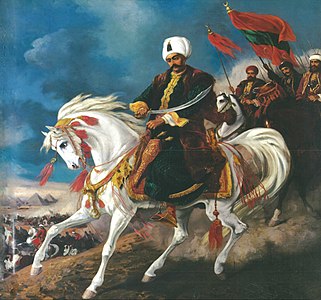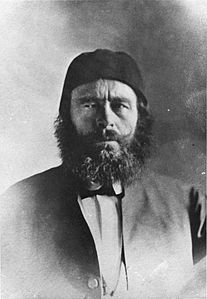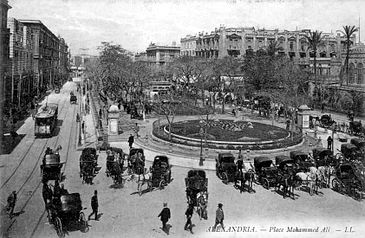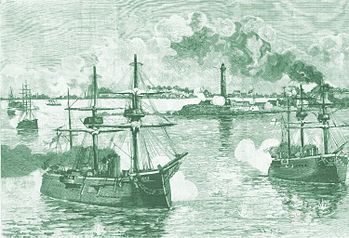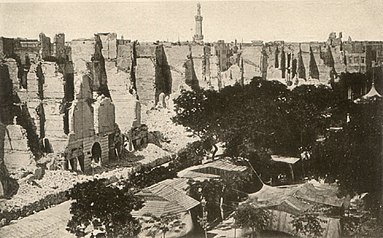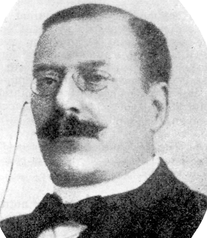Swiss troops in Egyptian service

The Khedive Muhammad Tawfiq Pasha began in 1882 - without a link approved by Swiss authorities surrender and as part of the European Garde within its gendarmerie - a Swiss troops to secure the city of Alexandria one.
Swiss troops in foreign service was the name of the paid service of commanded, whole troop bodies abroad, regulated by the authorities of the Swiss Confederation by international treaties .
These treaties contained a chapter regulating military affairs: the so-called surrender (or private surrender if one of the contracting parties was a private military contractor).
The Khedives of Egypt
Sultan Selim I
1512-1520Muhammad Ali Pasha
1805-1841Muhammad Said Pasha
1854–1863Sultan Abdülaziz
1861–1876Ismail Pasha
1867–1879Muhammad Tawfiq Pasha
1879-1892
Sultan Selim I , "the cruel", had conquered Mamluk Egypt in 1517 and made it an Ottoman province. In the centuries that followed, the Mamluks succeeded in becoming more and more emancipated as provincial governors from the central power in Constantinople. In 1798, Napoleon with his Egyptian expedition overthrew the Mamluke factions that were at odds among themselves. After the British victory over the French, they were even removed and expelled in 1805 by the Turkish governor Muhammad Ali Pasha , who was of Turkish origin . As one of his successors his son Muhammad Said , and on his death Ismail Pasha , was proclaimed Wali (governor) of Egypt. Ismail received the hereditary title Khedive (viceroy) from Sultan Abdülaziz (against the doubling of the tribute!) In 1867 .
The Suez Canal

In 1858 the French lawyer and diplomat Ferdinand de Lesseps founded the Compagnie universelle du canal maritime de Suez , as an Egyptian company based in Alexandria and headquartered in Paris, with the aim of building the Suez Canal (see documentary under web links).
The shares were not very well received: 56% of the share capital of 200 million francs was placed in the market, mainly with French investors. The rest of 44% had to be taken over by the Ottoman governor of Egypt, Muhammad Said .
After overcoming various organizational, financial, political and technical problems, the canal, not yet fully completed, was opened in 1868 with lavish celebrations and 6,000 foreign and 25,000 domestic guests.
It was not until 1871 that all shoals and narrow areas had been eliminated in such a way that there were no longer any significant delays in transit and queues due to ground contact or shorelines by ships. The construction costs had risen by over 400 million francs and could only be financed with difficulty.
The high expectations of the canal's success remained unfulfilled for the time being and the canal's capacity utilization remained far below the assumptions. The revenue from fees was a constant nuisance and chronically too low due to the lack of international standards for ship surveying . The price of the share fell below half of its nominal value, the shareholders received neither the statutory interest on the share capital nor a dividend, and the directors only received a meager salary. Lesseps is said to have almost been beaten at a shareholders' meeting. In the end, the military had to be deployed to enforce an international fee schedule.
When its debt burden, due to the annual borrowing, amounted to almost 100 million pounds, Egypt was insolvent. Ismail Pasha was forced to sell his stake in Great Britain, the main user of the Suez Canal, in 1875. He also had to accept the deployment of a Franco-British group of experts to clean up the shattered Egyptian state finances.
The young Egyptians revolt
Because of his financial problems, Ismail Pasha became deeply dependent on donors and could be blackmailed. Great Britain, in particular, was the most important British colony because of the 7,000 km shorter sea route to India, and was by far the most interested in the Suez Canal and began to deploy more and more British government officials in Egypt. When Ismail began to resist, he was forced to abdicate and replaced by his more compliant son, Muhammad Tawfiq .
In 1680, Egypt had to use half of its state income to pay off debts . The consequences were a high tax burden, wage cuts and non-payment of wages for civil servants, as well as the dismissal of members of the army and officers. The situation escalated into a popular uprising led by War Minister Ahmed Urabi Pasha and, on June 4, 1882, into a massacre of European civilians in Alexandria.
Great Britain, concerned about the loss of control over the Suez Canal, immediately intervened militarily. At the Battle of Tel-el-Kebir in September, the Egyptian army was crushed in less than an hour and Urabi was captured. He was deported to Sri Lanka, the Urabi movement suppressed and Egypt was occupied by British forces for many years until 1956.
The European Guard ensures order and security in Alexandria
After the shock of June when 350 Europeans were massacred in Alexandria, Muhammad Tawfiq endeavored to restore the security of Europeans in Alexandria with the addition of a guard consisting of Italians, Austrians and Swiss to the local gendarme corps To achieve the return of the refugees.
Thus, in October 1882, a non-regular Swiss force was formed in Egyptian service.
| Name, duration of use |
Swiss Guard not regular 1882–1883 | |
| Year, contractual partner |
1882, individual advertising based on a "Règlement général pour le corps des sergents de ville et pour l'administration de ce corps du 18 December 1872" (German: General regulations [of the Prefecture of Alexandria?] For the city police and their administration from December 18 1872) by Théodore Portier, agent of the Khedives in Geneva.
However, the document is said not to have been known to the recruits and was no longer in force upon their arrival in Alexandria. |
|
| Stock, formation |
1 free corps of 420 men in 4 companies of 100 men. | |
| Origin squad, troop |
Swiss. | |
| Owner, commander, namesake |
|
|
| Use, events |
The shock of the massacre of June 1882 of 350 Europeans in Alexandria during the Urabi uprising, then the heavy bombing of the city by the British Navy (see web links) and finally the setting on fire of the European quarter by the withdrawing Egyptian army, had many of the partly long-established residents 60,000 Europeans (out of a total of 170,000 inhabitants of Alexandria) forced to flee.
However, the Khedive government worried about the return of its European compatriots. She commissioned her agents in Italy, Austria and Switzerland to recruit suitable men between 20 and 40 years old for their safety for a European guard of 1,000 men in the Alexandria gendarme corps. In Switzerland, this contract went to the agent of the Khedive in Geneva, Théodore Portier. He handed Hilaire Gay du Borgeal from Orsières and Martigny, the later professor, councilor and writer in Geneva, the patent as captain in this unit on October 8, 1882 in Geneva. He recorded his experiences there in a small brochure. It is our main source of information. When Captain Hilaire Gay arrived in Alexandria on October 17th, 1882, he found two companies each of Italian, Swiss and Austrian in the barracks of Ras-el-Tin - the first led by a captain, the second by Lieutenant Pillonnel and the third by a lieutenant - in a rather disorganized state. The guardsmen did not know what their job was, they had too few rifles and, apart from the red fez with black silk tassels as headgear, many of them lacked their uniforms. It consisted of a single-breasted brown tunic with yellow metal buttons with a star and crescent moon and red borders, a collar and envelopes, blue trousers, also with red borders, and a black hooded coat. 
Ottoman yatagan
Only the guards in front of the barracks could be equipped with the few Remington rifles, the other guardsmen wore a yatagan (Ottoman saber). Captain Gay took over provisional command of the European Guard until Colonel von Möckeln arrived. By then he had introduced a regular daily routine and a report system and organized the rapidly growing team into six companies of the same nationality and provided them with a cadre: 1 captain, lieutenant and sub-lieutenant, 2 brigadiers, 6-8 sub-brigadiers, 1 fourier and 100 men. The city of Alexandria was divided into police stations with a certain number of streets and squares that they had to monitor. The guards were changed every four hours and the head of the post assigned the double patrols their monitoring tasks in a part of the commissariat and a fixed patrol circuit. Important points of the city such as the city gates, the port and the prison were guarded in a similar manner. Captain Gay introduced the regular round-robin service, had it monitored by his superiors and accustomed the team to the disciplined regularity of everyday military life. When the commander of the Swiss Guard, Pierre Bauer from Geneva, arrived with the last transport of Swiss recruits, Gay had already moved the Swiss contingent to the more suitable barracks of Moharem-Bey near Fort Napoleon and the Sidi Gaber railway station to Cairo . He now took over command of the 1st Swiss Company. But soon the wages were no longer paid on time. Towards the end of the year a medical officer of the gendarmerie carried out a strict sanitary examination and declared whole rows of proven guardsmen (Swiss military service, foreign services in Africa, Foreign Legion) to be retired for minor reasons (varicose veins, etc.). The stocks of the companies have now been sharply reduced, the fourth company even completely abolished. An offer of two monthly sums and additional travel expenses to Marseille were offered to those who voluntarily quit the service. The money was only paid out after departure on the ship. Together with most of the officers, Captain Hilaire Gay took up this offer. The Swiss Guard in Khedivian service disbanded in early 1883 after a good three months. The process was followed in the international press. Even in the deepest German province there was a hint of glee. Some of those released joined the local gendarme corps or the Egyptian army. |
|
The advertising of the Khedivian agent Théodore Polier was violated, unless the federal authorities did not classify this Swiss guard as a military but as a police force, both against the Military Criminal Code of 1851 and against the Federal Criminal Law of 1853. It was not apparent to us from the available sources how the situation was in this regard.
However, the officers and guardsmen were allowed to join this Swiss troop in Egyptian service. The federal law of 1859 was directed primarily against the surrender system of the cantons and entry into the Foreign Legion. The European Guard of the Khedive Muhammad Tawfiq Pascha was, as part of the Egyptian gendarmerie, an official state troop one way or another, which a Swiss citizen was allowed to join according to the wording of the law if he did not neglect his Swiss military service. It was not until the Military Penal Act of 1927 that any foreign military service was prohibited.
bibliography
- Hilaire Gay du Borgeal: La Garde Européenne en Égypte , Librairie de H. Stapelmohr, Imprimerie Taponnier et Studer, Genève 1884.
See also
Web links
- Documentary about the Suez Canal (youtube video, English)
- Bombardment of Alexandria 1882 (English)
- The Remington Infantry Rifle M1867 (English)
- Demonstration of the Remington M1867 (youtube video, English)
Individual evidence
- ↑ a b c Hilaire Gay du Borgeal: La Garde Européenne en Égypte , Librairie de H. Stapelmohr, Imprimerie Taponnier et Studer, Genève 1884.
- ↑ Rudolf von Albertini, Albert Wirz: Colonialism. In: Historical Lexicon of Switzerland .
- ^ Pierre Reichenbach: Gay, Hilaire. In: Historical Lexicon of Switzerland .
-
^ The Spectator September 30, 1882, The British Governement In Egypt :.
" ... From the new Army? If that Army is Egyptian, it will be, even though officered from Europe, as able to revolt as the Sepoys (rebellious part of the population in the British colony of India) were; and what else can it be but Egyptian? We see statements published that the Khedive is hiring Swiss for his gendarmerie at £ 12 a month, and of course he can form in that way a Guard who will die round him, but he cannot make an army of such men. The cost would crush him, even if he could rely on his mercenairies never to seek predominant authority ... "
-
^ Daily Alta California, September 25, 1882, Affairs abroad section :
" BERNE , September 24th. - A number of men enrolled to serve in the gendarmerie in Egypt have arrived from Geneva, and more will follow shortly.
GENEVA , September 24th. - The men engaged for the police in Egypt must not be under twenty nor over forty years of age. Frenchmen and Italians are ineligible. The pay is from 150 to 300 francs per month. " -
↑ Approaches of the monthly gold according to Captain Hilaire Gay:
- Commander: £ 20
- Captain: £ 15
- Lieutenant: £ 12
- Brigadier: £ 10
- Sub-Brigadier: £ 7
- Guard: £ 6
-
↑ The entertainment gazette and gazette for the Schleiden district and the surrounding area (Official District Gazette ) of December 13, 1882, daily news section :
“ SWITZERLAND . - The Swiss recruited for service in the Egyptian gendarmerie are about to return to their homes all together. The people complain bitterly about the miserable treatment they had received and held the prospect that all those Swiss who let themselves be seduced by unscrupulous agents would return home soon. "
-
↑ Federal law on the administration of criminal justice for the federal troops (of August 27, 1851):
Article 98
The recruitment of “people who are on the federal or cantonal team registers” was not only prohibited but also made a criminal offense: in times of peace, prison or penal sentences and in times of war even the death penalty! -
^ Federal Criminal Law (of February 4, 1853):
Article 65
Anyone who recruits residents of Switzerland for prohibited foreign military service is punished with imprisonment and a fine.
This threat of punishment also applies to employees of advertising offices that are set up outside of Switzerland in order to circumvent the ban on advertising on Swiss territory. -
↑ Federal law, concerning advertising and entry into foreign military service (of September 30, 1859):
Article 1
Entry into those troops abroad that are not to be regarded as national troops of the state concerned is prohibited to any Swiss citizen without the approval of the Federal Council.
The Federal Council can only grant such a permit for the purpose of further training for the purposes of the patriotic defense system. -
^ Military Criminal Law (of June 13, 1927):
Article 94 A
Swiss citizen who enters into foreign military service without the permission of the Federal Council is punished with imprisonment of up to three years or a fine.
